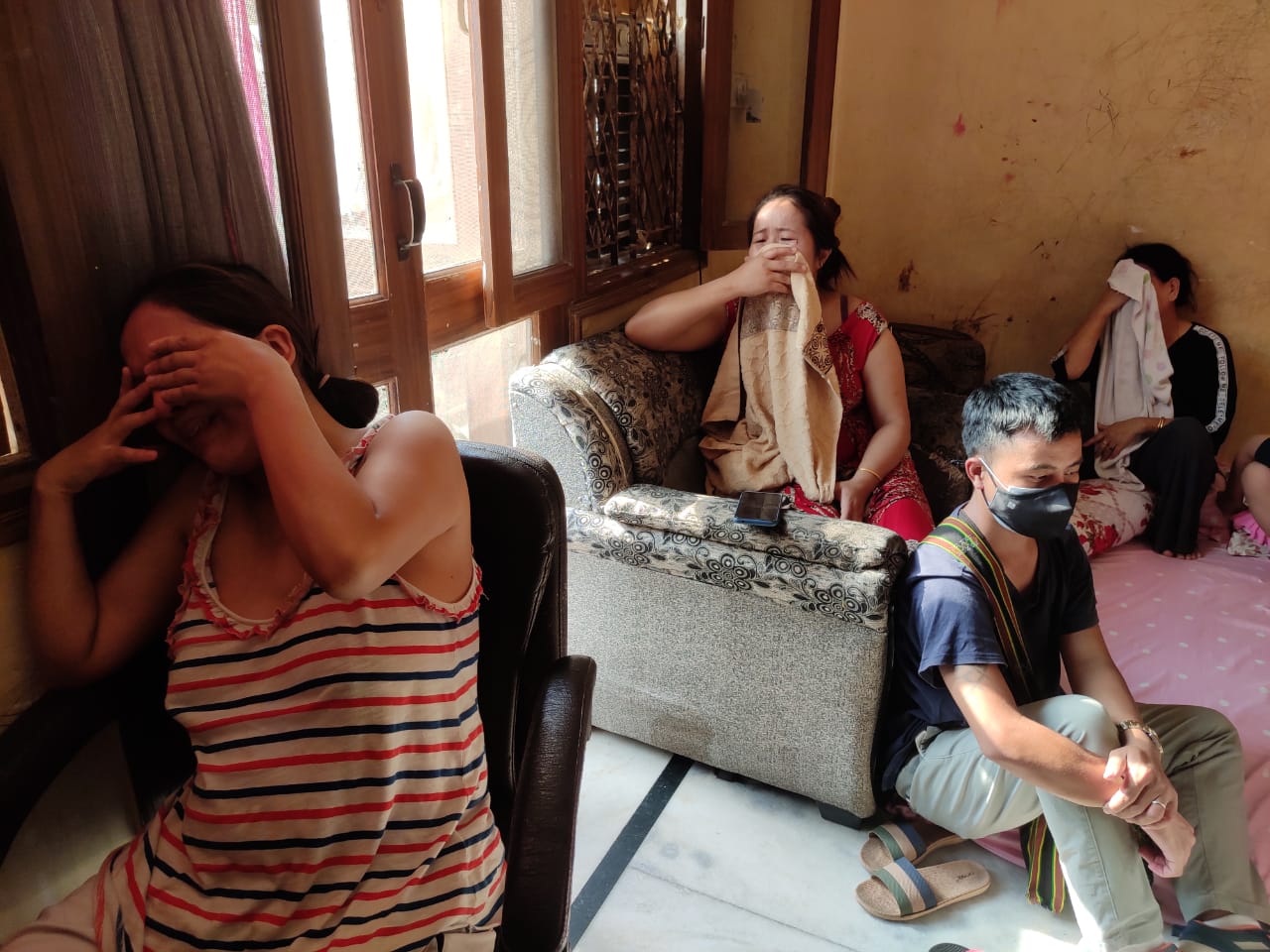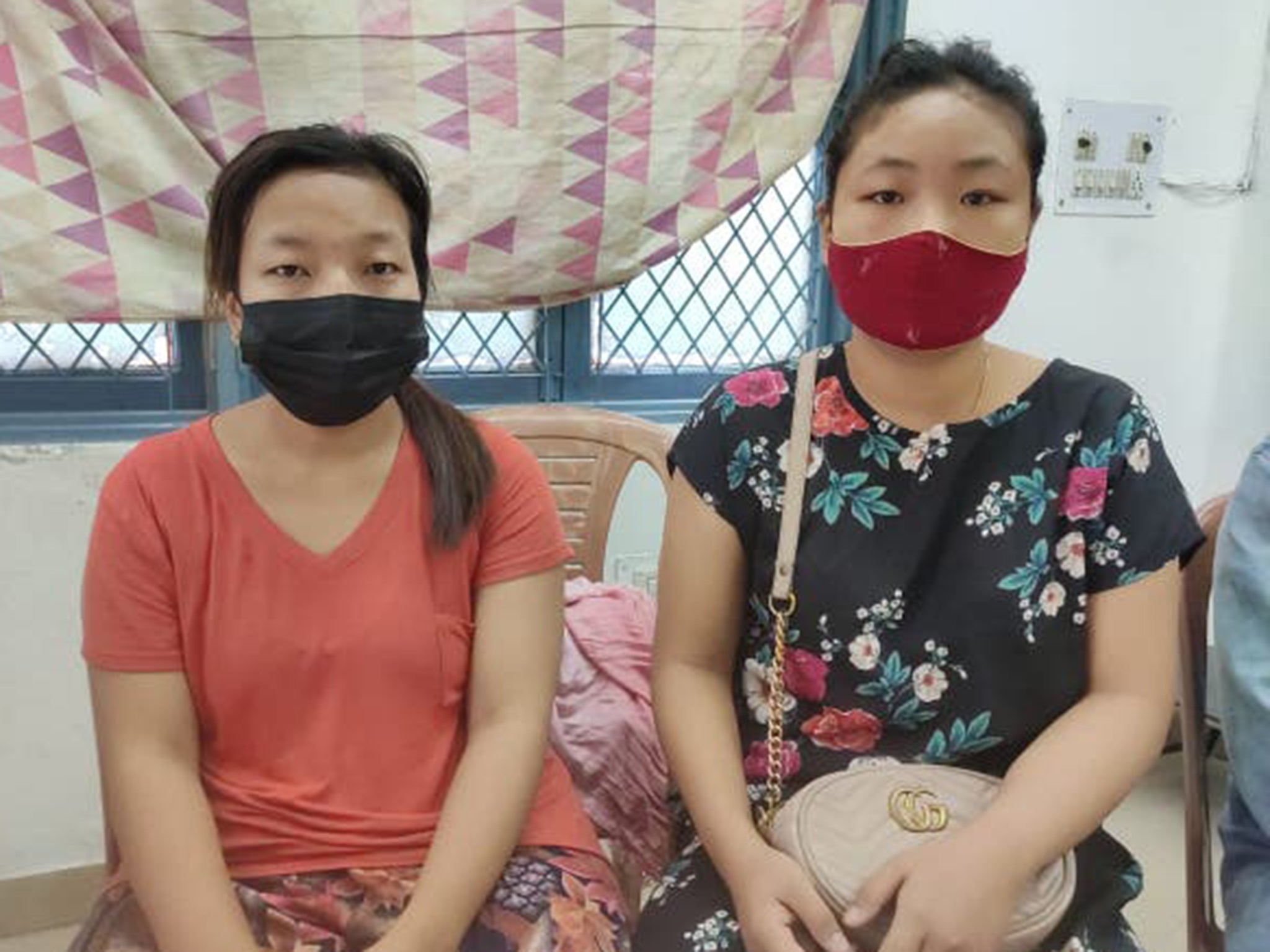‘How will we survive?’ As Covid rips through India, its unvaccinated refugees face death and discrimination
Even UN-registered refugees have been cut off from accessing vaccinations and say they face stigma from healthcare providers. Namita Singh meets some of them in Delhi


When Sang Hlun Thang noticed he had a soaring temperature and headache, he got himself and his family in India’s capital tested for coronavirus. Among the seven of them, three tested positive, including his mother and father. All of them were soon admitted to three different hospitals across west Delhi.
While his mother and father recovered, Thang did not make it. The 30-year-old had been admitted to Ayushman Hospital and Health Services. “The doctors promised us that he was going to recover within two weeks, but he did not,” his inconsolable five-months-pregnant wife, Biksim Sinman, tells The Independent.
He died on 16 April. “After over 10 days of hospitalisation, the doctors told us that his lungs were severely damaged from the infection as they informed us of his death.”
Thang, a Chin refugee from Myanmar, joined over 283,000 individuals who have lost their lives to Covid-19 in India, many of them in a devastating second wave that has swept across the nation since January. His family says that he should be counted among those who could have been saved had he received better medical care, as they allege discrimination and harassment by the hospital staff.
“My son kept asking hospital staff for something to eat. And after begging them 100 times, they would serve him something. He had to beg for each meal he was served,” says Ruth Biaktha, 60, in between her sobs. “My son begged them like an orphan but they couldn’t care less.
“At one point things got so miserable for him that my son told us on the phone that he tried jumping from the window to escape from the place. But he could not. He did not have enough strength to jump,” says his grieving mother.
Thang had come to India with his family in 2010 after escaping violent persecution from the Burmese military. He was among 21,049 Myanmar refugees registered by the UN High Commissioner for Refugees (UNHCR) as living in India.
He thought that the family had made it through the worst and was destined for a bright future, says his widow. “We had gotten a calling letter from Australia’s Refugee and Humanitarian Program in 2019 before the pandemic hit. We were supposed to go there and settle. But the visa kept getting delayed due to the Covid situation.
“If only he had gotten better treatment, my son would still alive,” says his mother.
In a statement, a spokesperson for the Ayushman Hospital called the family’s allegations of discriminatory treatment “baseless”, saying “we completely deny [them]” and that all medicines and food were provided “on time, as per the advice of the treating doctor”. “We, as a healthcare services provider, follow ethical and medical evidence-based practice without any discrimination [on grounds of] race , sex [or] religion,” they said.
With the second wave of Covid-19 still tearing through India, which recorded almost 270,000 new infections on Wednesday, the country’s overwhelmed health system is teetering on the edge of collapse. Shortages of hospital beds and oxygen have contributed significantly to the official death tolls, while the real figures are likely to be much higher.
If Thang was lucky to have at least received an ICU bed, Cing Seihlun was not. An unregistered Chin refugee who crossed the Myanmar border with five cousins earlier in April this year, she died within days of reaching Delhi. The cause of her death is not known. She was not able to book herself a Covid test as she did not have a relevant identity card required for testing.

“When we saw that she is getting sicker by the day, we tried calling hospitals, doctors and even clinics. No one responded because proof of identity was the first requirement,” Paulam Cing, a 23-year-old cousin of the deceased, tells The Independent. “We tried booking her for a blood test, we tried for two days but we could not. We could not even get her an ambulance.”
The nightmare did not end here. As the cousins were dealing with the sudden death of their cousin in the one-room flat, the landlord added to their woes.
“We had not even buried our sister’s body when the landlord barged into our flat asking us to vacate it,” she says. Now living in a church run by the Chin refugees settled in Delhi, Paulam and her four other surviving cousins are staring at an uncertain future.
Roshni Shanker, the executive director of the Migration and Asylum Project, a refugee law centre based in Delhi, tells The Independent that while the refugees registered with UNHCR have access to government health facilities, that is still dependent upon the limitations of the medical infrastructure itself.
“I know refugees who have been able to access the government hospitals with their refugee cards. However, in the current situation I have [also] been hearing of them being turned away because the hospitals are overwhelmed,” she says with a note of caution.
“I don't know if I can say that refugees are deliberately being denied government facility because the situation is so out of control that nobody is able to get a bed right now. So, it does not surprise me when refugees come and tell us that they also don’t have a bed.”
The disastrous impact of the pandemic is not limited to loss of life. The lockdown has also rendered many unemployed, including both refugees and Indian citizens alike. “Since the pandemic began, getting regular work has been more than difficult,” says a Rohingya refugee, speaking to The Independent on condition of anonymity. “While I had an income of about 9,000 rupees (£87) a month [before], it has now plunged to less than 3,000 rupees.”
He says that during last year’s lockdown, the UNHCR provided them with food rations. “We also received aid from the sub divisional magistrate and police station. But this year it has been completely missing,” he says.
“It was Ramadan, so locals supported us with whatever they could. But now that Eid is over, I don’t know how will we survive,” says the 28-year-old refugee.
Like others, he laments India’s current policy of not including refugees in its coronavirus inoculation drive.
“I have neither money nor the means to afford the expensive treatment [if I get sick]. And since we are kept out of the vaccination drive, what will we do? The virus does not see where we come from when it attacks.”
India started its inoculation drive in January but has so far vaccinated only a fraction of its population, administering 182 million doses among a total population of 1.4 billion. The country attempted to address the alarming rise of the second wave by rapidly ramping up vaccinations, but found itself with an acute shortage due to a lack of raw materials and a delay in investment in manufacturers.
When the country did open its vaccination drive to all adults from 1 May, it allowed only citizens with one of 11 specified types of identity document to register for jabs. That didn’t include refugee ID cards – effectively excluding the country’s more than 240,000 refugees and asylum seekers.
“The vaccine policy is going to be a problem because the government portal only accepts certain documentation for vaccine registration if you are a non-citizen. These include your passport, PAN [tax number] or Aadhaar [biometric ID] which typically refugees in India are not going to have. Their UNHCR-issued ID card is not one of them,” explains Ms Shanker.
She argues that in order to successfully tackle the pandemic, the vaccination policy has to be inclusive. “It has to be inclusive to anybody and everybody. It could be a refugee, it could be an unregistered foreigner or anyone without documents.”
“But the fact is, everybody needs to overcome this. So, at this stage, I would not say that you should have specific policies for migrant workers and specific policies for refugees. I think we are on a war footing. So, I think literally everybody needs to be jabbed. What we need is an immediate relaxation of the documentation requirement for vaccine registration” she says.
Join our commenting forum
Join thought-provoking conversations, follow other Independent readers and see their replies
Comments